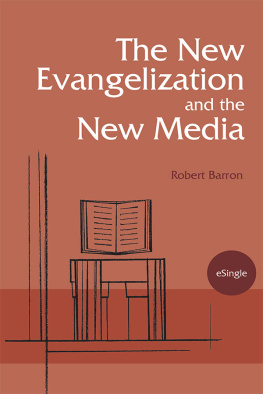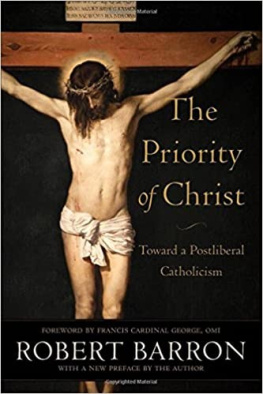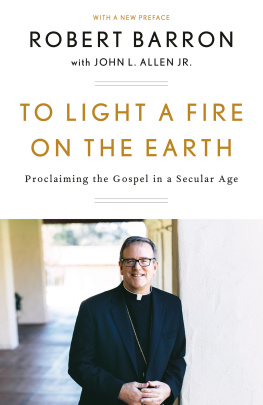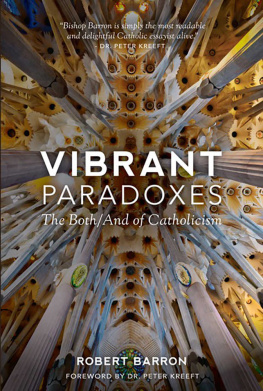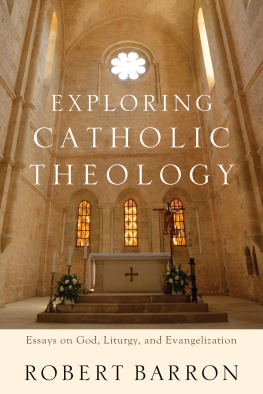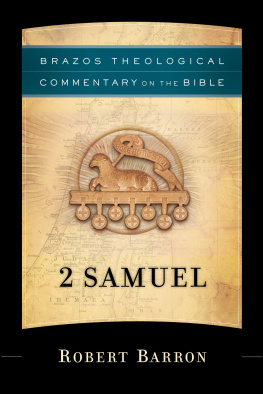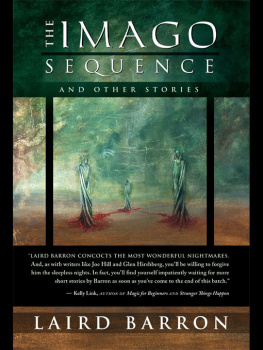Robert Barron - The New Evangelization and the New Media
Here you can read online Robert Barron - The New Evangelization and the New Media full text of the book (entire story) in english for free. Download pdf and epub, get meaning, cover and reviews about this ebook. year: 2014, publisher: Liturgical Press, genre: Religion. Description of the work, (preface) as well as reviews are available. Best literature library LitArk.com created for fans of good reading and offers a wide selection of genres:
Romance novel
Science fiction
Adventure
Detective
Science
History
Home and family
Prose
Art
Politics
Computer
Non-fiction
Religion
Business
Children
Humor
Choose a favorite category and find really read worthwhile books. Enjoy immersion in the world of imagination, feel the emotions of the characters or learn something new for yourself, make an fascinating discovery.
- Book:The New Evangelization and the New Media
- Author:
- Publisher:Liturgical Press
- Genre:
- Year:2014
- Rating:5 / 5
- Favourites:Add to favourites
- Your mark:
- 100
- 1
- 2
- 3
- 4
- 5
The New Evangelization and the New Media: summary, description and annotation
We offer to read an annotation, description, summary or preface (depends on what the author of the book "The New Evangelization and the New Media" wrote himself). If you haven't found the necessary information about the book — write in the comments, we will try to find it.
Few Catholics leaders today have made use of new electronic media as effectively and engagingly as Fr. Robert Barron. In this essay, Fr. Barron offers important insights into the lessons he has learned and the secrets to his success, all within the context of explaining in fascinating detail exactly what the New Evangelization is (and is not) all about.
The New Evangelization and the New Media — read online for free the complete book (whole text) full work
Below is the text of the book, divided by pages. System saving the place of the last page read, allows you to conveniently read the book "The New Evangelization and the New Media" online for free, without having to search again every time where you left off. Put a bookmark, and you can go to the page where you finished reading at any time.
Font size:
Interval:
Bookmark:

LITURGICAL PRESS
Collegeville, Minnesota
www.litpress.org
Robert Barron is the rector and president of the University of St. Mary of the Lake/Mundelein Seminary and founder of Word on Fire Catholic Ministries.
Cover design by Ann Blattner. Illustration by Frank Kacmarcik, OblSB.
The following is excerpted from We Preach Christ Crucified, ed. Michael E. Connors, CSC, published by Liturgical Press. Copyright 2013 Order of Saint Benedict, Collegeville, Minnesota. All rights reserved.
2014 by Order of Saint Benedict, Collegeville, Minnesota. All rights reserved. No part of this book may be reproduced in any form, by print, microfilm, microfiche, mechanical recording, photocopying, translation, or by any other means, known or yet unknown, for any purpose except brief quotations in reviews, without the previous written permission of Liturgical Press, Saint Johns Abbey, PO Box 7500, Collegeville, Minnesota 56321-7500.
ISBN 978-0-8146-4914-5
Over the last several years, much has been published, posted, tweeted, and spoken about the new media, by both Christian and secular experts. Opinions differ about what is effective, what doesnt work, and what more could be done. But amidst this speculation, Id like to turn our attention to the content side of the new media. Thats what Ive been doing at Word on Fire over the yearsproviding evangelistic content through videos, articles, podcasts, and blog postsand Ive learned much from working with the new media and its new expressions. Ive learned mainly by just digging in and experimenting, mostly with my YouTube video commentaries on culture.
When YouTube emerged on the scene, I noticed how videos of cats jumping off of roofs would get a million views. I thought, couldnt this work for spiritual and religious content, too? So I posted some commentaries, starting with an eight-minute commentary on Martin Scorseses The Departed. That video quickly drew in thousands of views. I continued posting more, and while my colleagues and I didnt know who would watch these video commentaries, weve discovered to our delight and surprise that millions of people have watched them over the years.
From the demographic data on YouTube weve determined that our videos are mostly viewed by men in their 20s, 30s, and 40sa group that, coincidentally, the church is not very good at reaching. How else would the church reach out to disaffected, maybe non-believing, men of that age group?
For this reason and more, Im an excited fan of YouTube. I must admit that I enjoy a bit of what the French call joie de guerre (the joy of battle). I love entering into the comment boxes on my videos and conversing with the folks who engage me online. In doing so, Ive learned an awful lot not only about what gets in the way of the proclamation of faith. From these YouTube commentsof which about ninety percent are negativeIve learned what really concerns folks and challenges their thinking and behavior. Ive then been able to use these comments as starting points for other videos and projectsand, of course, in preaching.
In this essay I will share what Ive learned from my engagement in new media, beginning with a brief introduction to the new evangelization, and show how these insights can fuel your own preaching.
To understand the new evangelization, perhaps its best to return to that iconic image of John XXIII announcing the Second Vatican Council. Hes in a room with a huge globe next to him, and at that press conference he uses, for the first time, a lovely, lyrical phrase: lumen gentium. Of course this later became the title of one of the councils principle constitutions, as that constitution opened with the assertion that Christ is the Lumen Gentium.
Its the churchs job to illuminate or enlighten the gentes , to bring that light to the nations. John XXIII wanted, it seems to me, a missionary council that would make the church a more appropriate vehicle for the proclamation of Christ. Aggiornamento ? Yes, indeed, in the measure that the church should be brought up-to-date so as to make it a more effective vehicle for evangelization. Aggiornamento , it seems to me, but not in the sense of using the modern world as the norm by which the church is measured.
It is well known that many non-Catholics were invited as observers to the Second Vatican Council. One of these was the Swiss Reformed theologian Karl Barth. Barth was deeply honored by that invitation. At the end of the council, one of the key questions the theologian brought to the council fathers with whom he met was What does aggiornamento mean? Accommodating and updating he was told. But he replied: Accommodating to what? In effect, Barth questioned when they would know that the church was sufficiently updated.
Now this was a question with a sting in its tail. Barth was asking, Are you using the modern world as the norma normans ? Is the modern world the norm by which the church is measuring itself? Is the project modernization in that sense? Or is the project the Christification of the world and the modernization of the vehicle aimed at that end?
The idea and impetus of Vatican II was to bring Christ out from the church into the world. Several years before the council, Hans Urs von Balthasar wrote a book entitled Razing the Bastions. He believed that the church was crouching or sequestering itself behind medieval walls and that those walls needed to be knocked down to allow the life of the church to flood the worldto get the Lumen Gentium out to the gentes. He wasnt advocating a program of modernization, as if the church must get itself up-to-date. He was, rather, focused on knocking down the walls that prevented us from evangelizing well.
Moving forward to 1975, we receive that outstanding document by Pope Paul VI: Evangelii Nuntiandi. People often appeal to John Paul II for the new evangelization, as they should, but prior to that pontificate stands this extraordinary text of Paul VI, where he states, in effect: The church doesnt have a mission. The church is a mission. That is a deeply John XXII and Vatican II idea. The churchs very identity is to bear the light to the nations.
Its no coincidence that in attendance at the synod that produced Evangelii Nuntiandi was the archbishop of Krakow, Karol Wojtyla. In fact, he wrote one of the preliminary drafts of Evangelii Nuntiandi. Therefore its no surprise that when he becomes John Paul II just three years later, the new evangelization becomes one of his principal concerns. It came out of his experience at Vatican II and of producing Evangelii Nuntiandi.
In 1983, not yet five years into his pontificate, John Paul II gave a now-famous speech in Port-au-Prince, Haiti, where he characterized the new evangelization as basically the same old evangelization (at least in content)the declaration of Christ risen from the dead. But he added that we need new ardor, new expressions, and new methods. That little triplet, repeated often in documentation and speeches thereafter, is my organizing principle for the remainder of this essay: new ardor, new expressions, new methods.
Vatican II was a missionary council. At the end of the day, this is the take-home from Yves Congars detailed journal of the council. Its one of the most entertaining books Ive read. At 1,100 pages, its an enormous tome and, to be sure, not every page is compelling. Its more a diary than a novel. But Congar is such an entertainingly caustic observer. For instance, he will talk about meeting with a certain bishop and say, What a bore. Or about some famous theologian, hell write, He talks too much. While very entertaining, the book awakened for me that whole wonderful sense of what the council was aboutthis missionary enthusiasm now to bring the church to the world.
Font size:
Interval:
Bookmark:
Similar books «The New Evangelization and the New Media»
Look at similar books to The New Evangelization and the New Media. We have selected literature similar in name and meaning in the hope of providing readers with more options to find new, interesting, not yet read works.
Discussion, reviews of the book The New Evangelization and the New Media and just readers' own opinions. Leave your comments, write what you think about the work, its meaning or the main characters. Specify what exactly you liked and what you didn't like, and why you think so.

